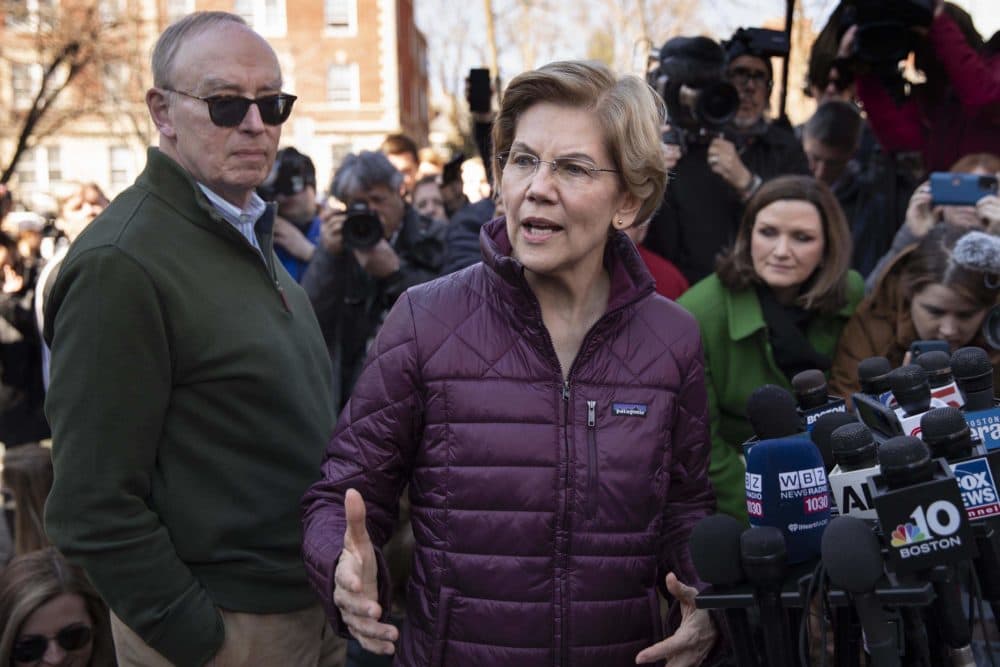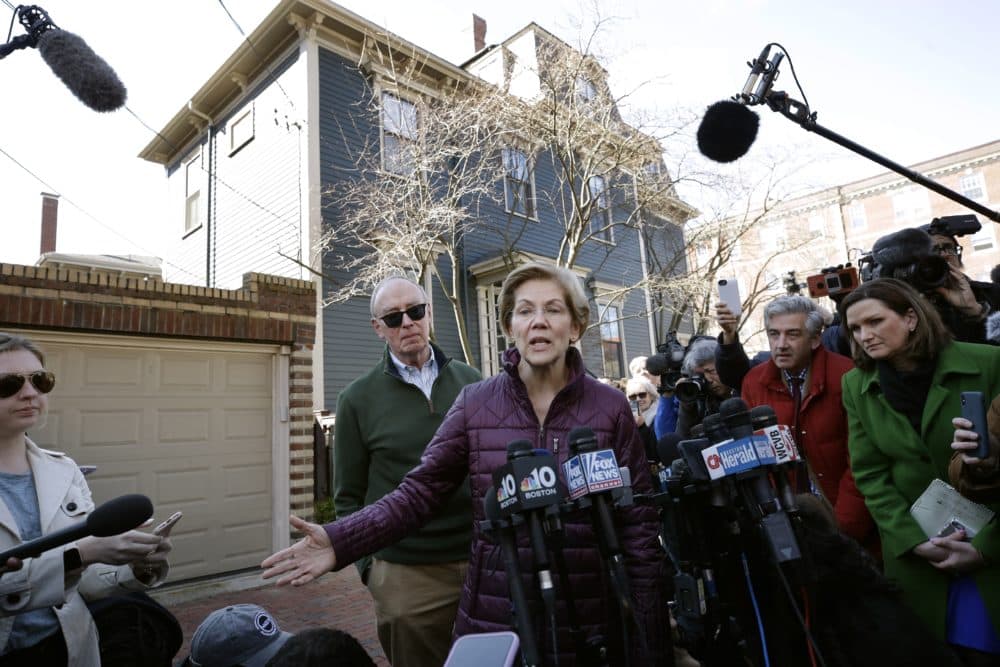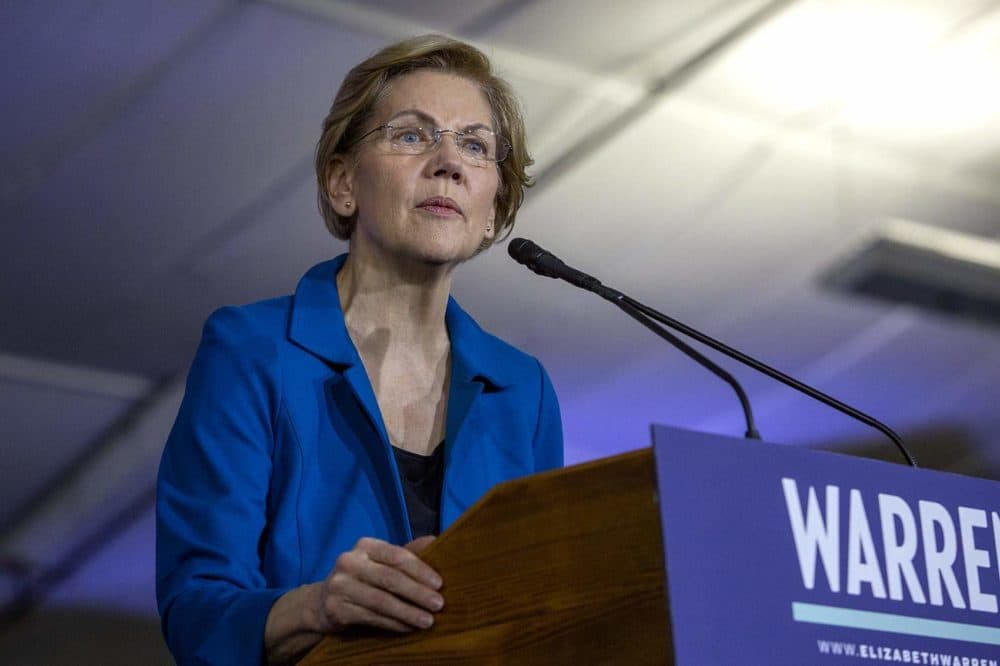Advertisement
Elizabeth Warren Ends Her Presidential Campaign

Elizabeth Warren, the senator from Massachusetts with a plan for just about everything, ended her bid for president Thursday. The senator is dropping out after a string of disappointing performances in the early primary contests culminated in a final reckoning on Super Tuesday.
Warren, who failed to come in first — or even second — in any primary contest, placed third in her home state of Massachusetts, behind former Vice President Joe Biden and Vermont Sen. Bernie Sanders. Her withdrawal comes in spite of recent vows to stay in the race until the Democratic convention.
"We didn’t reach our goal, but what we have done together – what you have done – has made a lasting difference," Warren told her campaign staff on a phone call Thursday morning. "It’s not the scale of the difference we wanted to make, but it matters – and the changes will have ripples for years to come."
Warren's once-ascendant campaign peaked in October, fueled by the mantra that, in America, the game is rigged against middle- and working-class families in favor of corporate interests and the super-rich. If elected president, Warren promised, she was singularly equipped to level the playing field, and she backed up her claims with a steady stream of detailed policy proposals. Among them: a plan to break up big tech companies; a new tax on the super-wealthy; and a multi-pronged anti-corruption gambit to root out the influence of lobbyists and money in Washington. These "plans" became Warren's calling card.
But after a rise in popularity, Warren's momentum faltered. Her candidacy was dogged by skepticism around her commitment to "Medicare for All" and polling that suggested President Trump would best her in key battleground states. The latter became fodder in an ongoing debate about gender and "electability," and public perception of whether a woman could win in 2020. An August poll from Quinnipiac showed Warren polling at 21% in the Democratic field; yet just 9% thought Warren had the best chance of beating Trump in the general election.

Warren officially launched her candidacy in early 2019 positioning herself as a progressive alternative to democratic socialist Sanders. While their policy proposals — universal Medicare, free four-year college, universal childcare, doubling the minimum wage — often bordered on indistinguishable, Warren tried to set herself apart from the Vermont senator on her approach to politics.
From the beginning, Warren declared herself a firm believer in free-market capitalism, seeking to level the playing field via regulatory overhaul — a clear departure from Sanders' rhetoric of revolution. Where Sanders has maintained virtually the same philosophy and outsider approach to politics for his entire career, Warren sought to highlight her promise to fight for the big, systemic change she believes the country needs, tempered by a willingness to evolve in the face of changing circumstances and work across factions to get things done.
Advertisement
At times, Warren did also part ways with Sanders on policy. She voted for Trump's North American trade deal in January, for example, after the White House strengthened protections for workers and other labor law concessions. Sanders voted against the agreement, on the grounds that it made no mention of climate change.
But over her campaign, Warren struggled to clarify her own constituency — and ultimately her message. She began her run as an ultra-progressive with the skills to get things done in Washington. Later, she modeled herself as a unifier, declining to attack her rivals, and hanging out the welcome sign to centrist liberals worried about Sanders' socialist vision and general election prospects. In the final weeks of her campaign, she shifted again, becoming the pugnacious fighter unafraid to land haymakers on the other presidential competitors. Ultimately, she failed to convince enough voters from either faction: the progressives rallied around Sanders and the centrists split between candidates like Amy Klobuchar and Pete Buttigieg.
Warren also struggled with nonwhite voters, polling at just 9% support among respondents in a Washington Post/IPSOS survey of black Democrats in January.
On race, Warren's campaign faced controversy early on over her claim of Native American ancestry, based, she says, on "family stories." The issue emerged during Warren's entry into electoral politics in 2012 and became a frequent line of attack for Trump as he battled Warren from her position in the Senate. And on the cusp of her presidential campaign, she ignited the controversy anew with her decision to release a DNA analysis showing a distant ancestry as an attempt to settle the matter — an attempt many saw as misguided and which drew criticism from the Native American community.
Months later, now an official presidential candidate, Warren apologized. Her team promised to prioritize the needs of indigenous peoples: Her proposal to empower native communities would provide targeted funding for healthcare, housing, education and economic development, along with new pathways to opportunity and fairer representation in federal government.
For much of 2019, Warren's pitch for big, structural change seemed to be working, with much of the progressive vote torn between her and Sanders. Yet the two candidates refused to attack each other publicly, maintaining that they were friends and allies fighting for the same cause, even as the vitriol between their supporters ramped up.
Cracks in the camaraderie opened wide in January, when a Sanders campaign script instructing door-knocking volunteers to explain that Warren was a candidate for "more affluent people who are going to show up and vote no matter what" and was not expanding the party base. Shortly after, it was reported that Sanders told Warren in a 2018 private meeting that a woman could not win the presidency, a claim Warren quickly confirmed as true. The resulting fracas, amplified across social media, culminated in a tense interaction between the two candidates after the debate in Iowa, in which Warren accused Sanders of calling her a "liar" on national TV.

The pretense was over, and the mutual energy between Sanders and Warren supporters — supporters who arguably want very similar policy outcomes — became increasingly polarized.
As a one-time registered Republican and bankruptcy lawyer, Warren's transformation into one of the country's most progressive senators has been unusual. Warren's early academic work reflected a pro-corporate ideology where free markets reigned supreme and regulations always made things worse. It was her field research in the early 1980s that she says radically changed her views.
“I set out to prove [that people filing for bankruptcy] were all a bunch of cheaters,” Warren said in a 2007 interview on University of California Television. “I was going to expose these people who were taking advantage of the rest of us by hauling off to bankruptcy and just charging debts that they really could repay, or who’d been irresponsible in running up debts.”
But through her research of local court records around the country, Warren concluded the vast majority of people and families filing for bankruptcy were honest and hardworking. There wasn't something wrong with them; there was something wrong with the system.
This article was originally published on March 05, 2020.
